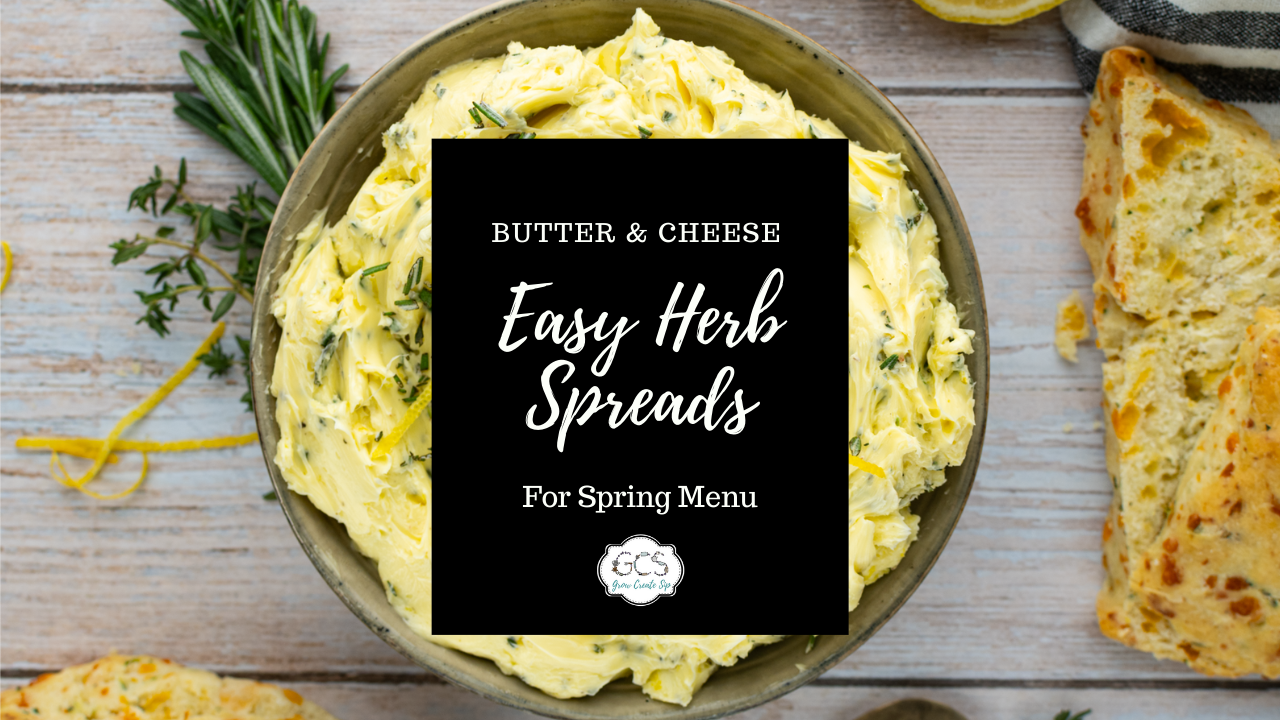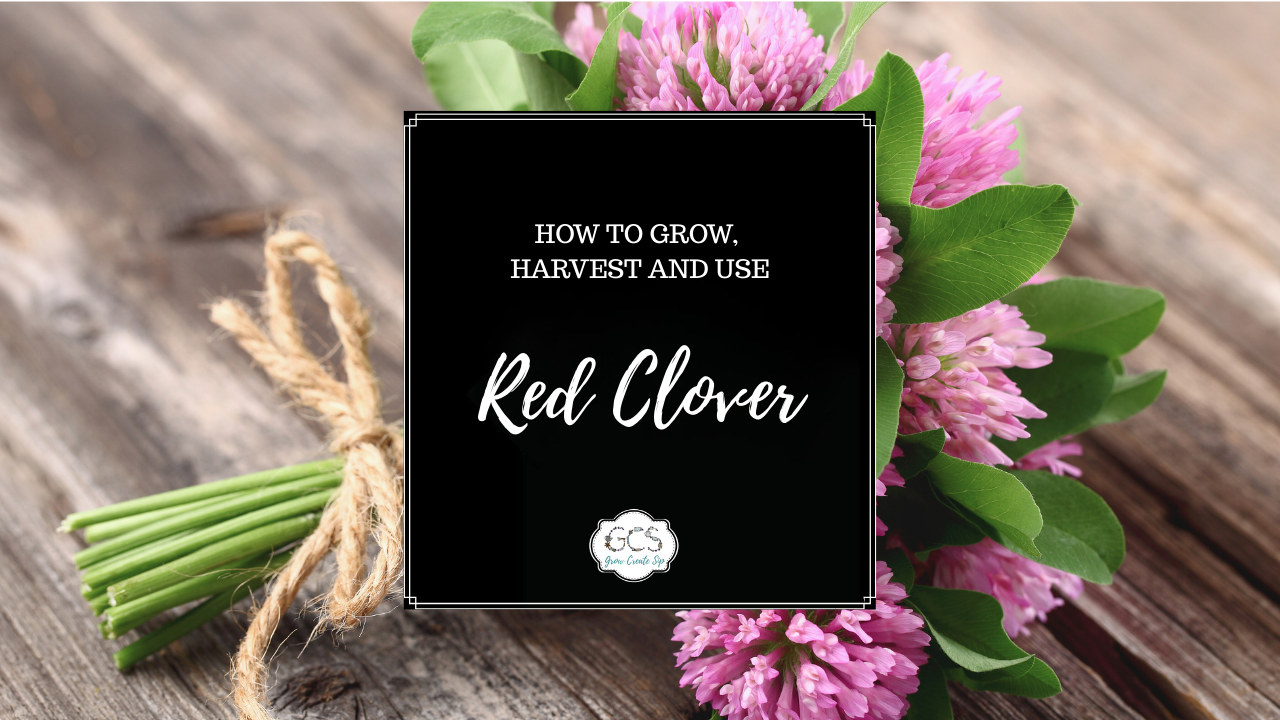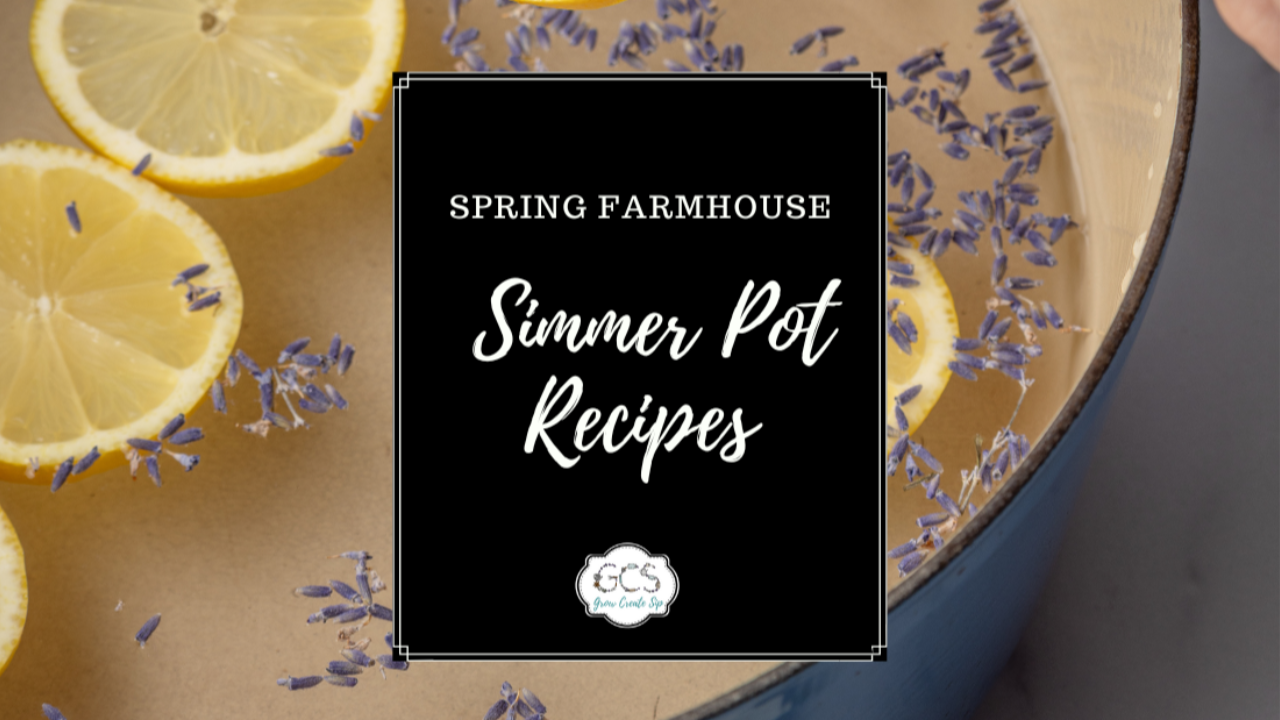Health Benefits of Kombucha & How to Make Kombucha at Home
May 02, 2023
Did you know that the first recipes of kombucha tea date back as far as 221 BC, which marks the beginning of China's Qin Dynasty? This popular fermented tea has a long and fascinating history and while it might be trendy right now, that trend is here to stay.
Kombucha is popular especially among soda pop drinkers because of its effervescent, fizzy nature which helps cut out the processed ingredients without cutting out the flavor. If you have been looking to replace a soda habit with a better one, kombucha may be for you!
Even if you are not a soda drinker, but you are looking to improve your gut health, boost your immunity, and reduce inflammation, then you might want to consider adding kombucha to your daily diet.
If you have tried kombucha at the store, you are in for a treat with homemade kombucha. The flavor options are endless as well as the savings that you get when brewing affordable kombucha at home. If you can make sweet tea then you can brew kombucha for pennies on the ounce!

The Legal Stuff
The contents of this blog are made available via St. Fiacre's Farm LLC through Grow Create Sip and Farmhouse Teas and are for informational purposes only. This blog does not constitute medical advice; the content is not intended to be a substitute for professional medical advice, diagnosis, or treatment. Always seek the advice of a qualified healthcare provider with any questions you may have regarding a medical condition. If you think you may be suffering from any medical condition, you should seek immediate medical attention. You should never delay seeking medical advice disregard medical advice or discontinue medical treatment because of information provided by St. Fiacre's Farm, Farmhouse Teas or Grow Create Sip. Reliance on any information provided by this webinar is solely your own risk. St. Fiacre's Farm LLC (along with Farmhouse Teas and Grow Create Sip) is a participant in the Amazon Services LLC Associates Program, an affiliate program designed to provide a means for our team to earn fees for recommending our favorite products! Along with additional affiliate programs not associated with Amazon. We may earn a small commission, at no additional cost to you, should you purchase an item after clicking one of our links. Thanks for supporting us!
What Is Kombucha?
Kombucha is basically a fermented sweet tea that is cooled and then a culture of bacteria and yeast known as SCOBY is added.
During fermentation, the SCOBY pellicle feeds on the sugar in the tea. It then releases various health-promoting compounds, including the following:
- Organic acids
- Enzymes
- Vitamins
- Probiotics
Kombucha is a good source of antioxidants that help to neutralize harmful free radicals in the body, protecting cells from damage.
The organic acids in kombucha, such as acetic, lactic, and gluconic acid, have antimicrobial properties. These properties can slow down the growth of harmful bacteria in the gut. Additionally, kombucha may support the following:
- Digestive process
- Boost the immune system
- Aid in weight loss
Making kombucha at home is easy and cost-effective. You can create a delicious, nutritious beverage with just a few essential ingredients and a SCOBY. Since raw kombucha benefits are superior over pasteurized kombucha, home brewed kombucha is the perfect option. Many commercial brewers that sell kombucha in the store pasteurize their brew before it hits the shelf and/or use additives and sweeteners that many of us don't want in our diet.
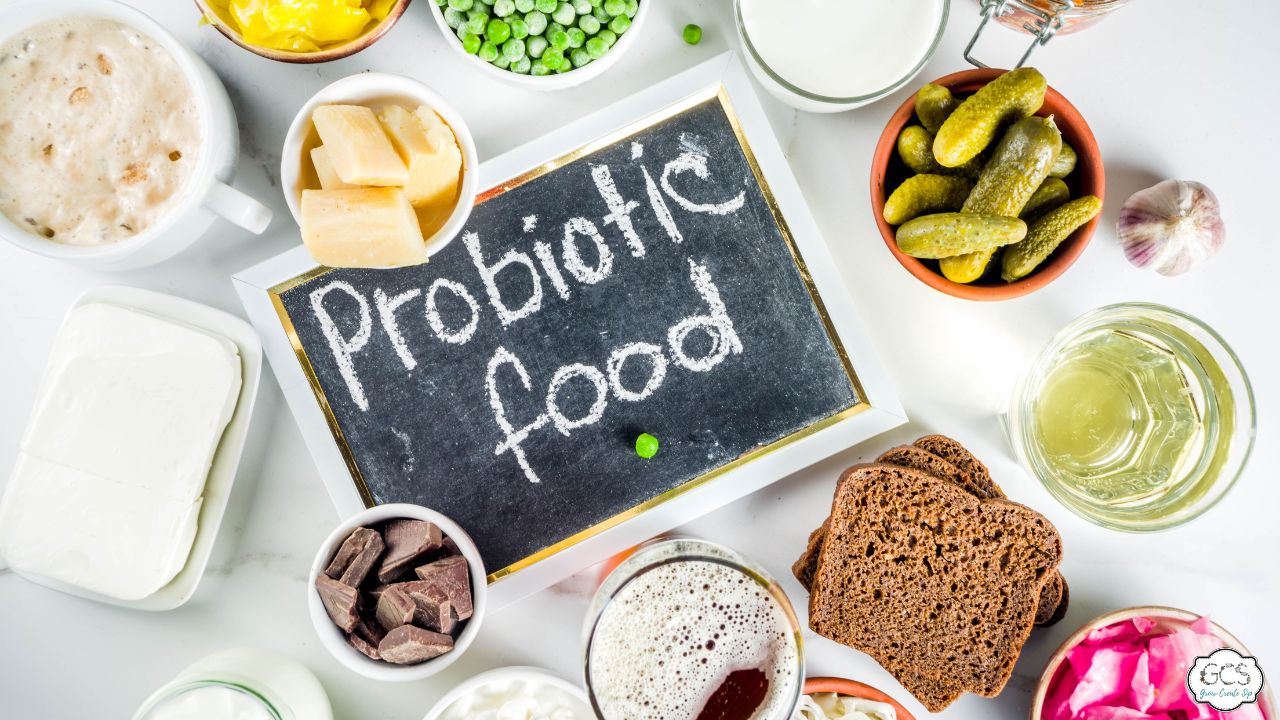
What Type of Probiotics are in Kombucha?
Probiotics are essential for maintaining good health as they promote a healthy balance of microorganisms in the gut. Kombucha is one of the best sources of probiotics.
What Are Probiotics?
Probiotics in kombucha are living microorganisms, such as bacteria and yeasts, that benefit the human body. These microorganisms are commonly found in foods and dietary supplements. They work to keep the gut's bacteria in a healthy balance, which is a key factor for overall health. After all 80% of our immune system is located in our digestive tract and dependent on the healthy gut bacteria.
Kombucha contains a variety of beneficial probiotics, including species of the following:
Lactobacillus Bacteria
The Lactobacillus bacteria in kombucha help break down food, absorb nutrients, and fight off "bad" organisms, which help to stop harmful bacteria from growing in the gut. This helps reduce the risk of infection.
Acetobacter Bacteria
Acetobacter bacteria produce acetic acid. This acid is special to kombucha and gives kombucha its tangy taste. Acetobacter also produces gluconic acid produced from its consumption of the tea and this acid is also responsible for creating the SCOBY pellicle as well as what is different between apple cider vinegar and kombucha. Gluconic acid is known to boost collagen levels and support skin moisture levels as well as being the main acid to contribute to kombucha detoxification properties.
Zygosaccharomyces or Yeasts
Kombucha also contains beneficial yeasts like Zygosaccharomyces. These help to break down sugars and are a type of saccharomyces boulardii. These yeasts can improve digestion and aid in nutrient absorption.
Saccharomyces Boulardii
Kombucha is most famous for its probiotic Saccharomyces boulardii which is used in hospitals to treat C. Diff. infections which are major gut infections and inflammation such as colitis and diarrhea. This particular probiotic controls H. Pylori and Candida when taken consistently for at least 3 days in a row as Saccharomyces boulardii is not naturally occurring in the digestive tract. With S. Boulardii dramatically reducing H. Pylori in the gut. It aides in the reduction of ulcers as well as cancer.
In addition to their digestive benefits, probiotics impact the following positively:
- Mental health
- Skin health
- Weight management
Fermented foods are a great way to add additional probiotics to your diet. Other fermented foods are raw sauerkraut, Tepache de piña, yogurt, water kefir, milk kefir, Jun, and kimchi. Adding in probiotics in a whole food form can result in significant savings as it reduces the need to purchase probiotics in more processed forms like capsules, tablets, powders or other dietary supplements. Getting your daily dose of probiotics in your food means that you are getting more varied and diverse strains as well than what you will find in any dietary supplement.
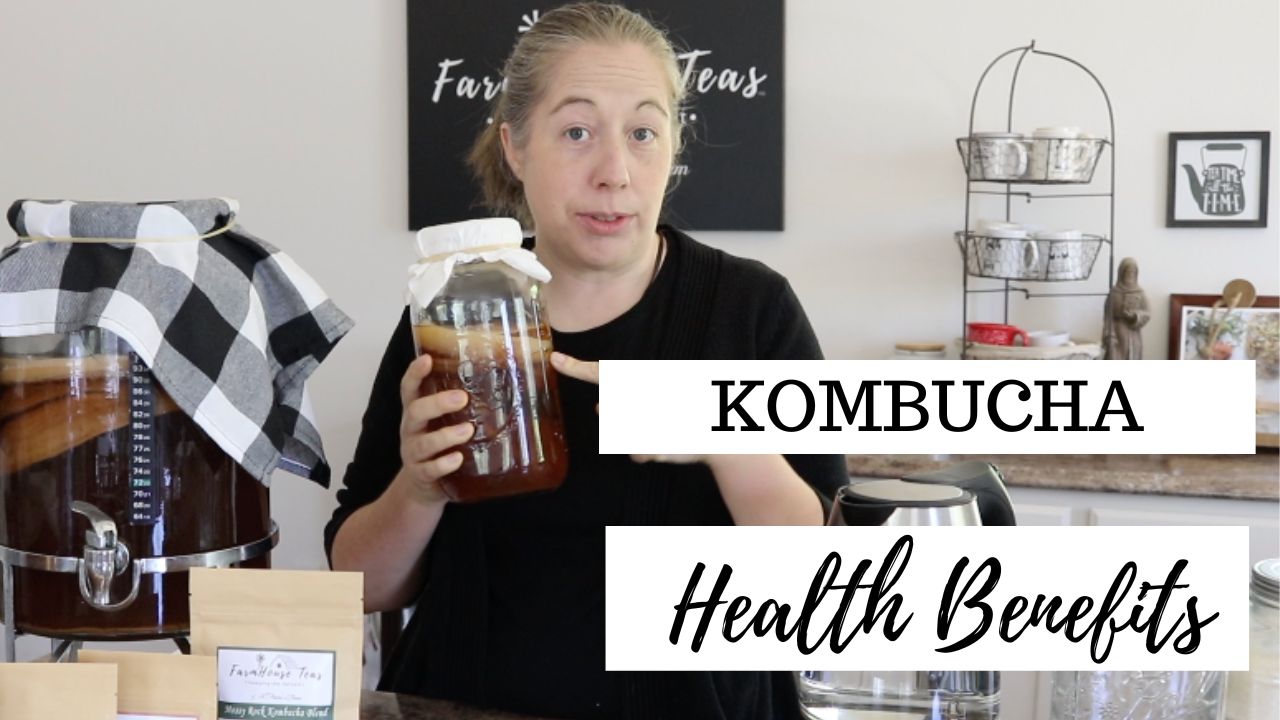
What Are the Health Benefits of Kombucha?
Kombucha contains a great many antioxidants that come from the black / green tea. The antioxidants contained in the camellia sinensis plant increase further during the fermentation process. The large amount of antioxidants in kombucha can greatly reduce inflammation in the body. Kombucha is also very high in b vitamins and also anti-microbial.
Studies show that kombucha may support the following health conditions:
- Ulcers
- Improved digestion
- Improved Metabolism
- Aides in detoxification of the liver and digestive system
- Constipation, IBS, Crohn’s, any digestive disease
- Anti-inflammatory
- Increased Energy - partly due to improved digestion
- Helps balance pH in the body
- Aides in arthritis reduction
- Aides in controlling blood sugars
- Improves mental health via gut brain connection
- When green tea is used may aide in weight loss
- The most recent study done on kombucha in 2023 was the first study done on humans instead of mice. It shows that kombucha aids type 2 diabetes.
The most recent study done on kombucha in 2023, the first done on humans instead of mice, shows that kombucha aids type 2 diabetes. It demonstrates that glucose handling improves with kombucha consumption during a normal meal which means that those consuming kombucha at meal times were better able to handle the carbs contained in that meal.
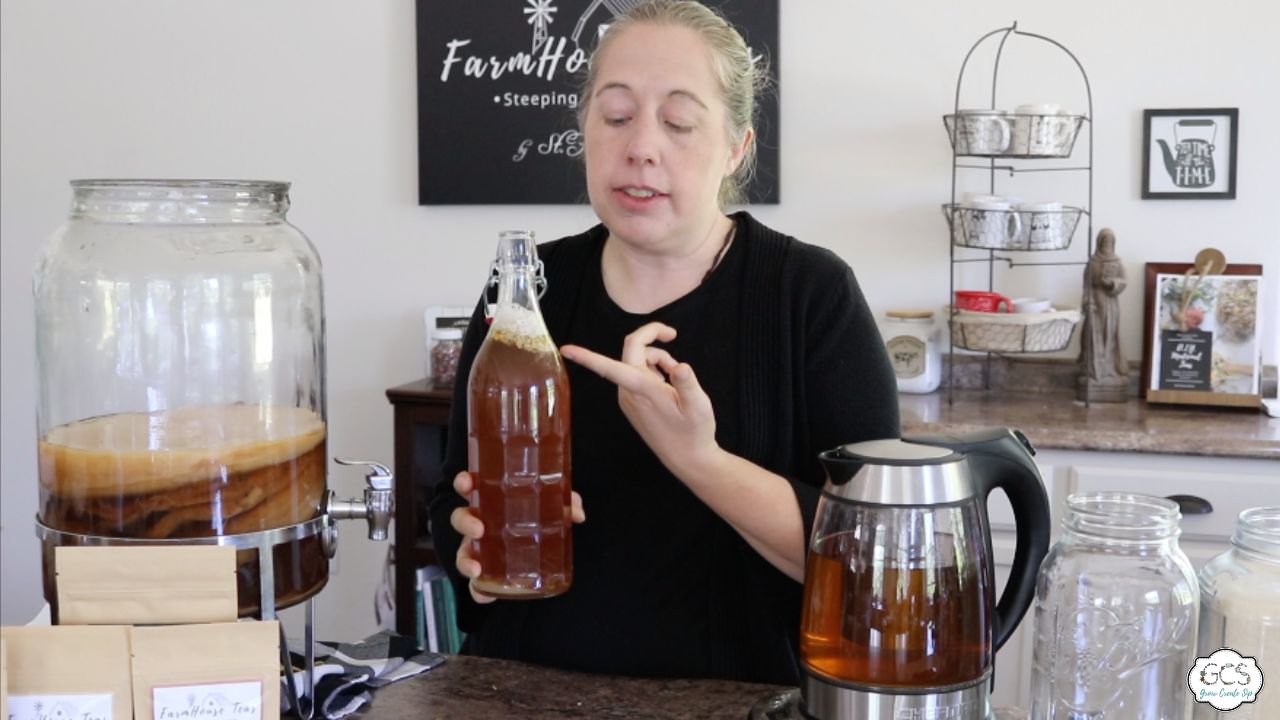
How Much Should Kombucha Be Consumed Daily?
The optimal amount of kombucha to consume varies based on several factors. These include:
- A person's age
- Your sex
- Your weight
- Your overall health
So, the answer is, it depends! There is no one answer that fits everyone. Nonetheless, it is recommended to start with a small amount, such as 1-4 ounces daily,gradually increasing the amount. It is also better to consume small amounts throughout the day rather than drinking your entire daily allowance in one sitting. By using this approach, you can effectively determine your body's tolerance levels. This way, you can recognize any adverse effects before gradually increasing your intake. It will take some time for your body to adjust to the new probiotics, oftentimes resulting in a "clearing out". This is a normal occurrence and should subside in a week or so. Do not increase your daily ounces until your body has settled into what you are currently consuming. Back off the amount of ounces per day if symptoms do not subside within a few days.
When should you not drink kombucha?
Kombucha is generally considered as safe but individuals with the following health conditions should avoid drinking kombucha or should check with their physician before adding it to their diet.
- Histamine Intolerance - Because kombucha is a fermented food, it has high levels of histamine and should be avoided by those with a histamine intolerance.
- Pregnant or nursing mothers - Kombucha detoxifies the liver. It is generally wise to avoid any plants or foods that promote detoxification while pregnant or nursing as the toxins released could affect the baby. Consult with your doctor or midwife before consuming.
- Fatty liver disease - Could stress the liver due to the liver detoxification and small amount of alcohol contained in home brewed kombucha.
- Those who avoid alcohol - ...may want to avoid it as kombucha can contain very small amounts of alcohol.
- Medications - Because kombucha may detox the liver, it can limit the effectiveness of prescription medications. Anyone on blood thinning medications should not consume kombucha.
The Price Breakdown of Making Kombucha at Home vs. Buying at the Store
Instead of buying it at the store, you can save money by making it at home. Most basic things you need to make kombucha at home, like a SCOBY, tea, sugar, and a glass jar, cost less than $60. This can make a few batches of kombucha, which you can bottle and flavor however you like having full control over the quality of the ingredients. Depending on which ingredients you use, home brewed kombucha can cost only pennies an ounce.
On the other hand, store-bought kombucha can cost anywhere from $4 to $7 per bottle, which adds up quickly if you drink it often. Also, many types of kombucha sold in stores have been pasteurized, which can kill good probiotics and other compounds. They may also contain a host of unwanted ingredients or only contain kombucha by name and instead mostly be made from carbonated water, synthetic flavorings, citric acid and fruit juice. Watch your ingredient labels! Don't pay too much for an impostor kombucha that doesn't have the same health benefits as an unpasteurized, home-brew kombucha.
The Cost of Kombucha at Home vs. the Cost of Capsules of Probiotics
While probiotic capsules can be expensive, with some costing upwards of $50 per bottle, kombucha provides a more budget-friendly option for promoting gut health and boosting immunity.
Drinking kombucha is an excellent way to introduce these beneficial bacteria into your system without breaking the bank and you get the additional benefits of the tea while consuming. Not to mention a whole food with a more diverse probiotic set vs a very processed probiotic capsule.
Moreover, various delicious and refreshing kombucha flavors are available, making it a tasty alternative to capsules.
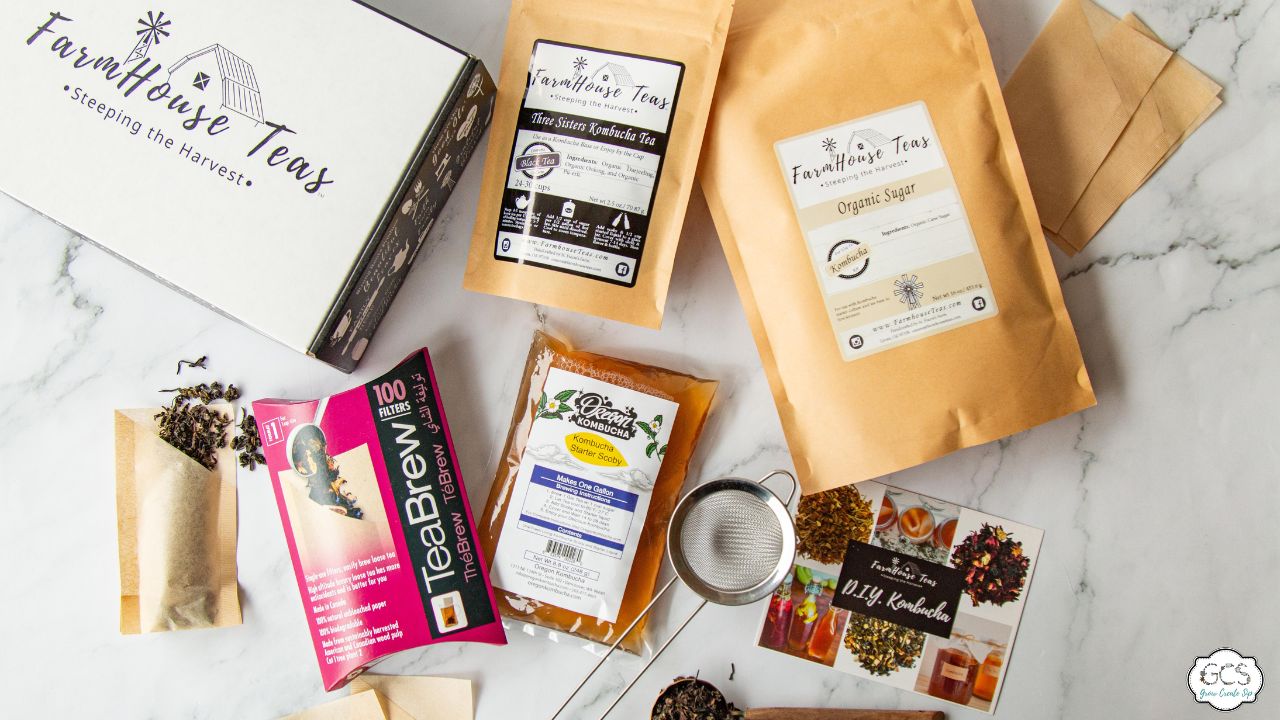
Photo by Kayla Joy Creative
What Basic Supplies Are Needed?
If you can brew sweet tea then you can make affordable kombucha at home! But how to make kombucha tea, is the question. Even if you take the Kombucha Mastery E-Course, to make it, you will need the following basic supplies:
A SCOBY
A "symbiotic culture of bacteria and yeast," or what most refer to as a "SCOBY," is a rubbery, fibrous disc that forms on the top of fermenting kombucha. It is a sponge like home for a living ecosystem of microorganisms that ferments the sweet tea mixture and produces the tangy, slightly effervescent beverage known as kombucha. These microorganisms are also contained within already fermented kombucha tea which is also necessary for brewing your batch of kombucha.
The SCOBY, scientifically known as the pellicle, and the already fermented tea contain a variety of beneficial bacteria and yeasts that play a vital role in the fermentation process, converting the sugar in the tea into organic acids and other compounds that give kombucha its characteristic flavor and health benefits.
Black or Green Tea
Black and green teas are two of the most popular types of tea, both of which are produced from the Camellia Sinensis plant's leaves. Black tea is more heavily oxidized than green tea, which gives it a stronger, more robust flavor, while green tea is less processed, resulting in a lighter, more delicate taste. Black tea is the most commonly used tea for kombucha while green tea is more popular when brewing Jun Kombucha.
Granulated Sugar
Granulated sugar is a key ingredient in kombucha-making, as it provides the food source for the SCOBY / pellicle during fermentation. The sugar is consumed by the microorganisms in the SCOBY / pellicle to produce the characteristic tangy flavor and effervescence of kombucha.Without sugar of some sort your kombucha will not ferment. If you can't use sugar, don't worry. There are other kombucha sweetener options if you cannot use granulated sugar.
Water and a Glass Jar
Clear, clean water is needed in order for kombucha to brew properly. Water should be free of bleach and chlorine as these will kill good bacteria. As well as free from fluoride which is often found in city water. Quality water = quality kombucha.
Water Types:
- Filtered water: You can purchase filtered water from the store or use a charcoal water filter like a Brita or Berkeley.
- Distilled water: This is not ideal as distilled water is missing many of the food minerals that are normally present in our water supply, but it is usable.
- Spring water: A fine option if the water source is not treated and regularly tested.
- Rain water: If you collect your own rain water, be sure to filter it first using a charcoal filter before using it with your kombucha.
- Well Water: Often well water can contain rust and other unwanted minerals. It is best to filter it before using it to brew kombucha.
- Tap water: If tap water is all you have, filter or boil it first.
A Breathable Cloth or Coffee Filter and Rubber Bands
A breathable cloth or coffee filter and rubber bands are commonly used to cover the top of the glass jar during the fermentation process of making kombucha. The cloth or coffee filter allows air to circulate while keeping out contaminants as well as pests, and the rubber bands secure it tightly to the jar.
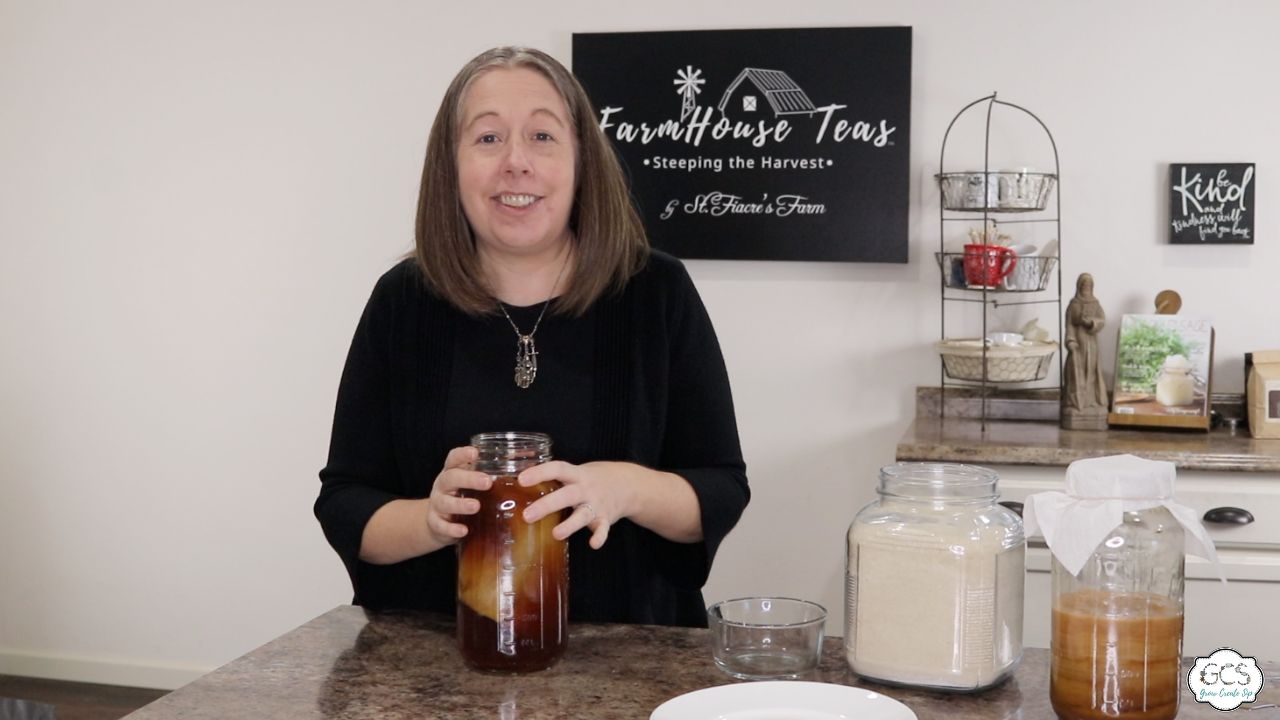
Step-by-Step How to Make Kombucha - 1st Ferment Kombucha (1/2 Gallon Size)
- In a large pot brew 4-5 teaspoons of black loose leaf tea in 1/2 gallon of clean water.
- Strain loose leaf tea and add 1/2 cup of sugar to strained tea.
- Stir sugar in until combined, then let the tea cool to room temperature.
- Pour the tea into a clean 1/2 gallon glass jar.
- Add 1/2 cup of starter tea (previously brewed kombucha) and the SCOBY / pellicle.
- Cover the jar with a coffee filter or a cloth that lets air in and seal it with a band.
- Store the jar in a warm place (such as a pantry or closet) for 7-10 days or until the kombucha has reached your desired level of sweetness and acidity.
- Then, taste it regularly to check the progress. Or test with a pH strip for 2.5 - 3.5 acidity
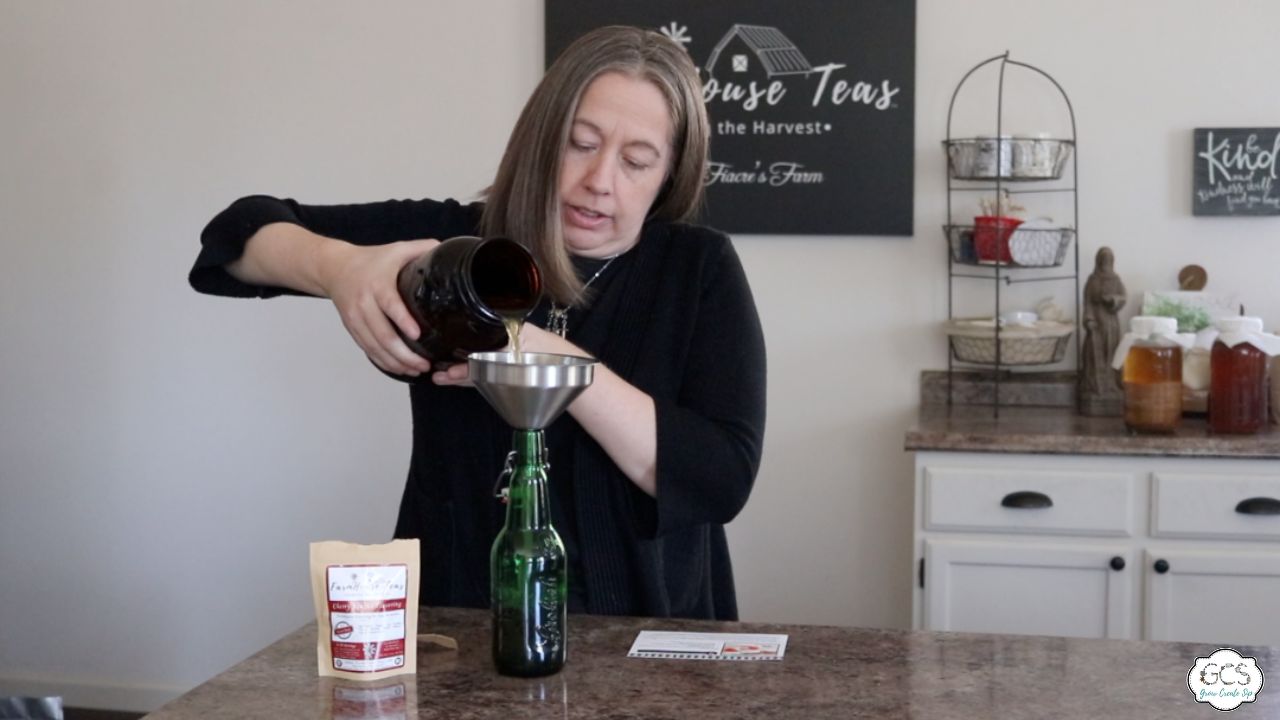
What Types of Bottles to Use
When bottling kombucha for the 2nd fermentation, it is essential to use bottles designed to handle the carbonation. Flip-top bottles, reused store kombucha bottles, and mason jars with airtight lids are all excellent options. Make sure to clean store bought kombucha bottles well before use and only use ones with lids that can screw back on.
Avoid using plastic bottles or containers as the acid in the kombucha can eat away at the plastic as well as pull the chemicals from the plastic into your drink. We want the health benefits of our kombucha without added chemicals. Also, use parchment paper between any metal lids as the kombucha acid may cause corrosion when coming into contact with aluminum lids. Stainless steel is fine to use.
Ideas for How to Flavor the 2nd Fermentation
The possibilities for flavoring your kombucha are endless! Here are some ideas to get you started:
- Fresh fruit (such as berries, citrus, or mango)
- Fruit juice (such as apple or pomegranate)
- Herbs (such as mint, basil, or rosemary)
- Spices (such as ginger, cinnamon, or cardamom)
- Honey or maple syrup or other simple syrups
- Premixed kombucha flavoring packets
Experiment with different combinations, the options are endless!
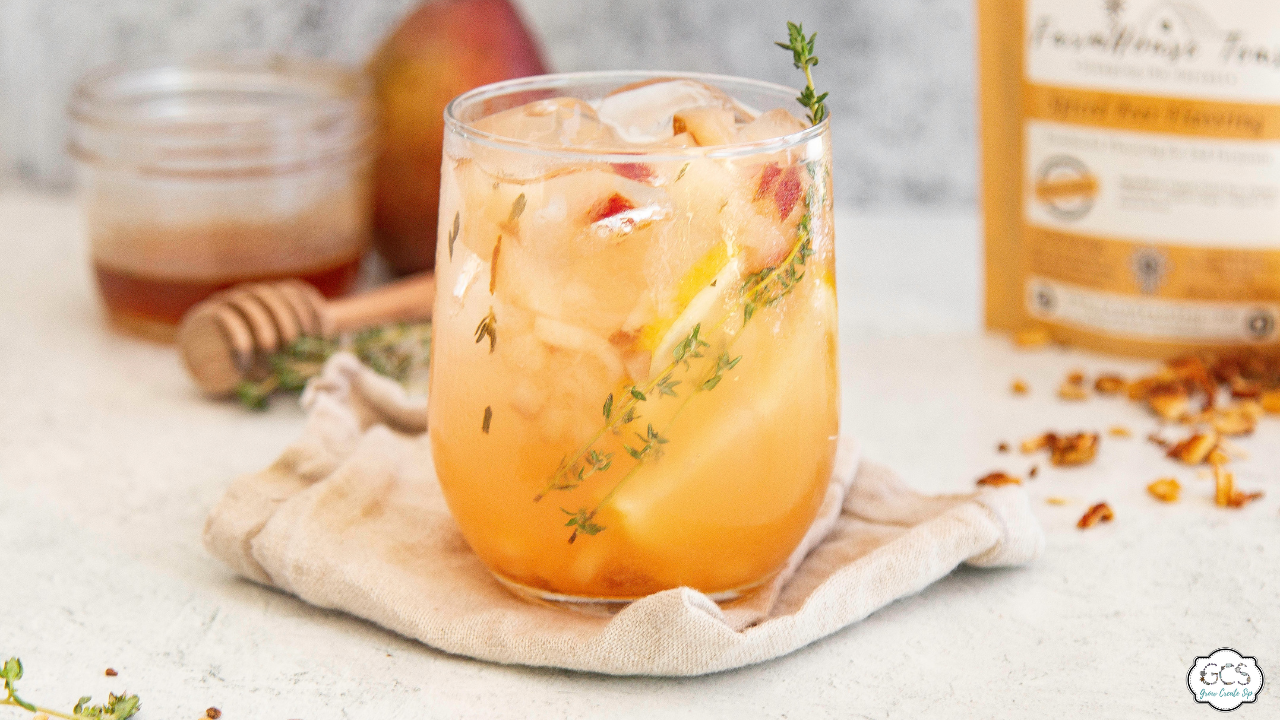
Photo by Kayla Joy Creative
Step-by-Step How to Bottle and Flavor Kombucha - 2nd Fermentation
- With very clean hands remove the SCOBY / Pellicle and 1cup of the kombucha liquid and set them aside for the next batch.
- Pour the remaining kombucha into a clean glass bottle or bottles. You can use flip-top bottles, reused store kombucha bottles, or mason jars with airtight lids.
- Add your desired flavorings to the bottles. Some popular options include fresh fruit, fruit juice, herbs, and spices.
- Seal the bottles and place them in a warm, dark place for 1-3 days, depending on the temperature of the room.
- After the 1-3 day infusion period, place bottles in the refrigerator for 24 hours to settle carbonation and prevent explosions.
- Strain any flavorings out, pour in your favorite fancy glass and enjoy!
Mastering the Art of Kombucha
Kombucha is a delicious and healthy beverage that is easy to make at home. As I always say, if you can brew sweet tea than you can make affordable kombucha at home! By following the steps outlined above, you can create your own customized batch of kombucha and enjoy all its health benefits at a fraction of the cost of store-bought brands.
Kombucha is an art as much as it is a science though and there are lots of little nuances that show up when home brewing a probiotic rich batch of bubbly goodness. Dive deeper into brewing your own kombucha with this free 3 video tutorial on brewing kombucha. Learn how to capture all the fizz and skip any mold with additional tutorials, and simplify brewing by starting out with the Homestead Kombucha kit.
I'd love to know, have you made kombucha at home before? If so, what has been your biggest trial? If you have never made kombucha before would you share with me in the comments below what has been holding you back?
Learn more about brewing Kombucha at Home
- Is my SCOBY moldy? Photo Guide
- Herbal Root Beer Kombucha Recipe
- Ideal Temperature for Kombucha and Heating Options
- Different Sugar Types to Use in Kombucha Brewing
- How to Grow a SCOBY from Scratch
- Guide to Bottling & Brewing Kombucha












